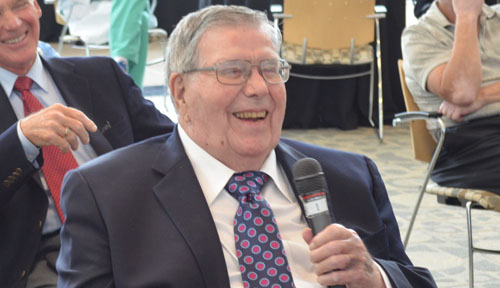Calling himself “a living example of the need for regenerative medicine,” Dick Holland used humor to mark the ribbon-cutting for the Mary and Dick Holland Regenerative Medicine Program, held Thursday at the Durham Research Center II.
Holland, university officials and other guests rode the elevator to the sixth floor of Durham II to cut the ribbon for the newly named program.
While Holland was willing to joke, others who spoke at a short event before the ribbon-cutting took the philanthropist much more seriously.
See more photos from the event here.
Nora Sarvetnick, Ph.D., director of the regenerative medicine program, called him a passionate believer in regenerative medicine and research and said his gift would greatly impact the program, improving recruitment efforts and strengthening key initiatives.
John Niemann, Ed.D., senior vice president of the University of Nebraska Foundation, called him an extraordinary friend and a distinguished leader.
See KETV coverage of the regenerative medicine program
UNMC supporter Mike Yanney called him “the single greatest difference-maker this city has.”
In the past several decades, Holland “has done a lot of things to change human lives,” Yanney said, citing his support not only of UNMC, but of cultural and educational institutions.
“I’ve never seen anyone like Dick Holland, who does it with flair, who does it with a lot of humor, and who never asks for anything in return,” Yanney said.
UNMC Chancellor Harold M. Maurer, M.D., called Holland and his late wife, Mary, “the epitome of giving.
“Without Dick and Mary, UNMC would not be where it is today,” he said. “They have supported construction of the Durham Research Centers, the Sorrell Center for Health Science Education, the Fred & Pamela Buffett Cancer Center, and many others, including the College of Public Health. We could not be more grateful to Mary and Dick for the gift to this regenerative medicine program.”
The regenerative medicine program brings together forward-thinking scientists and clinicians who are committed to understanding the basic science behind tissue engineering and development, Dr. Maurer said.
Holland said such programs are needed in medicine today.
“The ability to build organs and change lives is a great tool,” Holland said. “I know this isn’t going to be a cinch. Research has many paths, and some of them are very disappointing. You have to get over all the disappointments and just slog on.
“But I wish everybody who’s working on this Godspeed,” he said. “I think that if you strive to be leaders, you will get the full dose of glory.”
